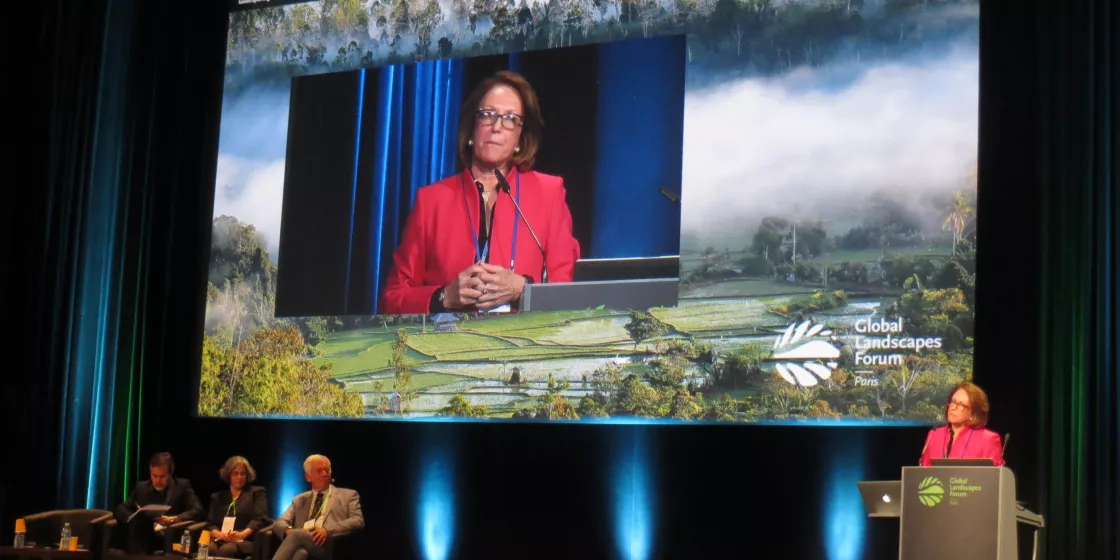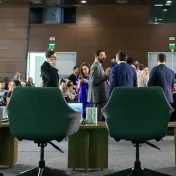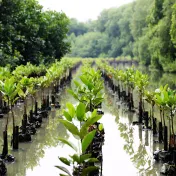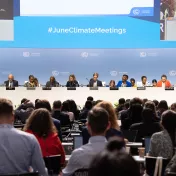As ministers, NGOs and legal advisers work day and night deliberating over the final brackets of the global climate compact at Le Bourget, kilometers down the road another forum focused on empowering a common climate agenda, one that integrates human development with the health of the earth’s forests, soils, and natural resources. Over December 5-6 at the Palais du Congress, the 3rd Annual Global Landscapes Forum (#GLFCOP21) was the largest other meeting in Paris during COP21, attracting close to 3,500 participants, exhibitors and speakers from across disciplines and sectors. Instead of focusing on national climate commitments, the GLF explored alternative ‘un-siloed’ approaches to land use in a warming world, and perhaps equally important, how to finance them.
Session topics during GLF were as diverse as the challenges facing environmental protection and sustainable development today: soil degradation, deforestation, food insecurity, youth migration, and water salinization were among the key issues. But over the course of the 2-day forum, a core message became clear: protecting human dignity and environmental integrity is not an either/or. Taking a landscapes view, our health and the health of the environment is interdependent, and mutually beneficial. As Danon CEO Emmanuel Faber told participants, “we can’t talk about anything, without talking about everything.”
Many of the landscapes-based solutions presented at the forum were driven by local communities, supported by national policy and funded by donor organizations. From indigenous tribes monitoring waterways in New Zealand, to replacing arms trade with local irrigations schemes in Costa Rica, landscapes projects were hailed as a win-win for both livelihoods and resource protection. And this is the way it must be, as CO2 sinks such as forests will be vital to keeping global warming at 2°C or less. “We cannot protect forests when they are surrounded by the hungry and the poor,” commented UNCD’s Louise Baker. “We cannot win at someone else’s loss.”
But one of the biggest sensitivities of the forum surrounded agriculture. As both the world’s largest employer and a USD 23 Trillion business a year, everyone is a stakeholder. Feeding 9 billion people by 2050 will require a transformation of practices to grow more food with less. However, smallholder farmers, who provide food for 2/3 of the population, need incentives just to stay in the business- like insurance against climate shocks and compensation for restoring soils. It is a complex issue as highlighted by Harrison S. Karnwea, Former Minister of Internal Affairs of Liberia, where recent peace has brought farmers back to their homes, but suddenly increased land degradation.
Projects that can harmonize smallholder livelihoods, food security, and sustainability, like agroforestry training for coffee growers in Burundi, need investors - the type who support a development agenda where returns on investment that aren’t always economic. Representatives from the financial sector, such as Credit Suisse’s Mark Burrows explained that “the people I represent will ultimately make the difference,” noting that sustainable agriculture will need 20 times more investment than that which governments and NGOs can provide. He asked governments to step into the role of ‘risk mitigator’ for agricultural investment, making it more stable in the short-term for projects with 10-15 year life cycles- a blink in the life of a agroforestry program.
Donor funding for projects, though welcomed by many developing country representatives at the Forum, is also a distraction, says Former Nigerian Finance Minister Ngozi Okonjo-Iweala. “60% of development capital for these efforts is coming from developing countries themselves, and that’s the way it should be.”
Throughout the Forum sessions and speeches, the answer to this challenge of finance and sustainability began to echo that of the official COP21 negotiations at Le Bourget: political will. This includes the will to regulate industry and empower the world’s most vulnerable and marginalized. This means inclusion of local communities who have been charged for centuries with protecting earth’s forests, watersheds and other precious resources.
As for the SDG’s, says indigenous collective director Tui Shortland, financing and reporting will not be enough to make the impending climate agreement a reality. For communities like her own, fighting to protect the forests of New Zealand, “collective action needs to be taken, monitored and measured, and this research should be shared with the international community.”
As CIFOR’s Peter Holgrem quoted from Mahatma Gandhi in his closing speech, “speed is irrelevant if you are going the wrong direction.” When countries agree on binding commitments to combat climate change and curb dependence on fossil fuels, the next step will be to implement sustainable solutions going in the ‘right direction.’ Perhaps landscapes, and the communities who depend on them, can offer some answers.




